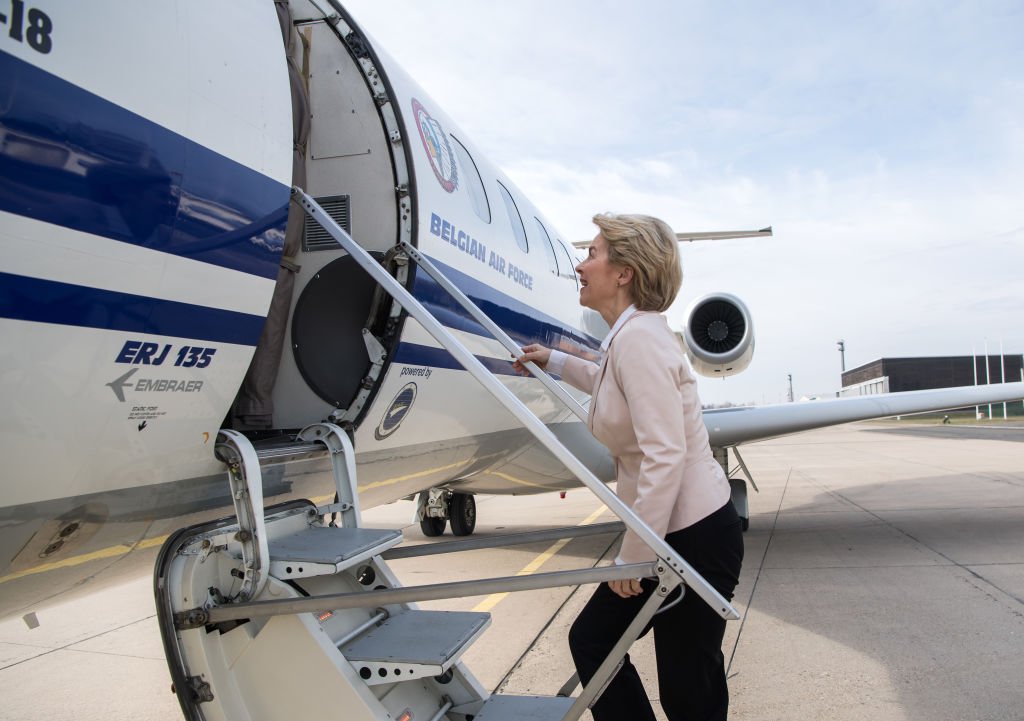Bulgaria appeared to contradict claims by Ursula von der Leyen’s office that the navigation system on the Commission president’s plane was targeted on Sunday as it approached the city of Plovdiv, adding to the confusion surrounding the flight.
“Throughout the entire duration of the flight, the transponder emitted a constant, good-quality GPS signal,” Bulgarian Prime Minister Rosen Zhelyazkov told his parliament on Thursday. “There is no indication of the presence of prolonged interference and jamming.”
Despite the Bulgarian government’s latest assessment, which was supported by outside flight experts, the Commission stuck to its story.
“There was GPS interference,” European Commission deputy chief spokesperson Arianna Podestà told reporters later on Thursday, adding that “radio interference was confirmed by the Bulgarian Air Traffic Services Authority” earlier this week.
Bulgarian authorities stated in a press release on Monday that the plane’s GPS signal had “disappeared” during the aircraft’s approach to the airport, forcing the pilots to use a backup electronic landing aid known as the Instrument Landing System (ILS).
Zhelyazkov told parliament, however, that due to Moscow’s widespread use of “electronic warfare” there is often radio interference along vast segments of the EU’s eastern border.
Going in circles
The saga began on Monday when the Financial Times reported that a “suspected Russian interference attack” had “disabled” the GPS navigation system of a plane transporting von der Leyen from Warsaw to Plovdiv on Sunday.
Citing “three officials briefed on the incident”, the newspaper, whose Brussels bureau chief Henry Foy was on the plane, reported that the jet ended up “circling the airport for an hour” before landing “using paper maps”.
The article prompted vehement denunciations of the Kremlin by top Western officials. Moscow denied any involvement. Podestà said later on Monday that Brussels had “received information from the Bulgarian authorities that they suspect this was due to blatant interference by Russia”.
Even in Monday’s press release, however, the Bulgarians did not say that the plane was forced to circle the airport for an hour or that paper maps were used during landing. Nor did they blame Russia for the incident.
Foy referred questions surrounding his article to the Financial Times and the Commission. The newspaper did not immediately respond to requests for comment.
By Monday evening Flightradar24, a flight-tracking service that is widely deemed to be credible by experts, was already questioning aspects of the story.
Flightradar24 said that Sunday’s flight took 1 hour and 57 minutes – only nine minutes longer than scheduled.
It also reported that the aircraft’s “transponder reported good GPS signal quality from take-off to landing” and that there was no evidence of so-called “spoofing” attacks, which aim to deceive a GPS receiver into reporting incorrect positions and speeds.
Flightradar24 did confirm that the pilots switched from a GPS to an ILS-based landing approach, but warned that “there are numerous issues that could have affected the crew’s ability to perform a GPS-based approach that aren’t related to jamming or spoofing”.
Asked about Bulgaria’s refusal to investigate the incident, Podestà said on Thursday that it is up to “the Bulgarian authorities to decide” what “course of action” they wish to take.
Podestà also refused to confirm that the plane circled Plovdiv airport for an hour or that the pilots were forced to use paper maps.
“What matters ultimately is the plane landed successfully, and, of course, this is the point that is of greatest interest for us,” she said.
(vc)





